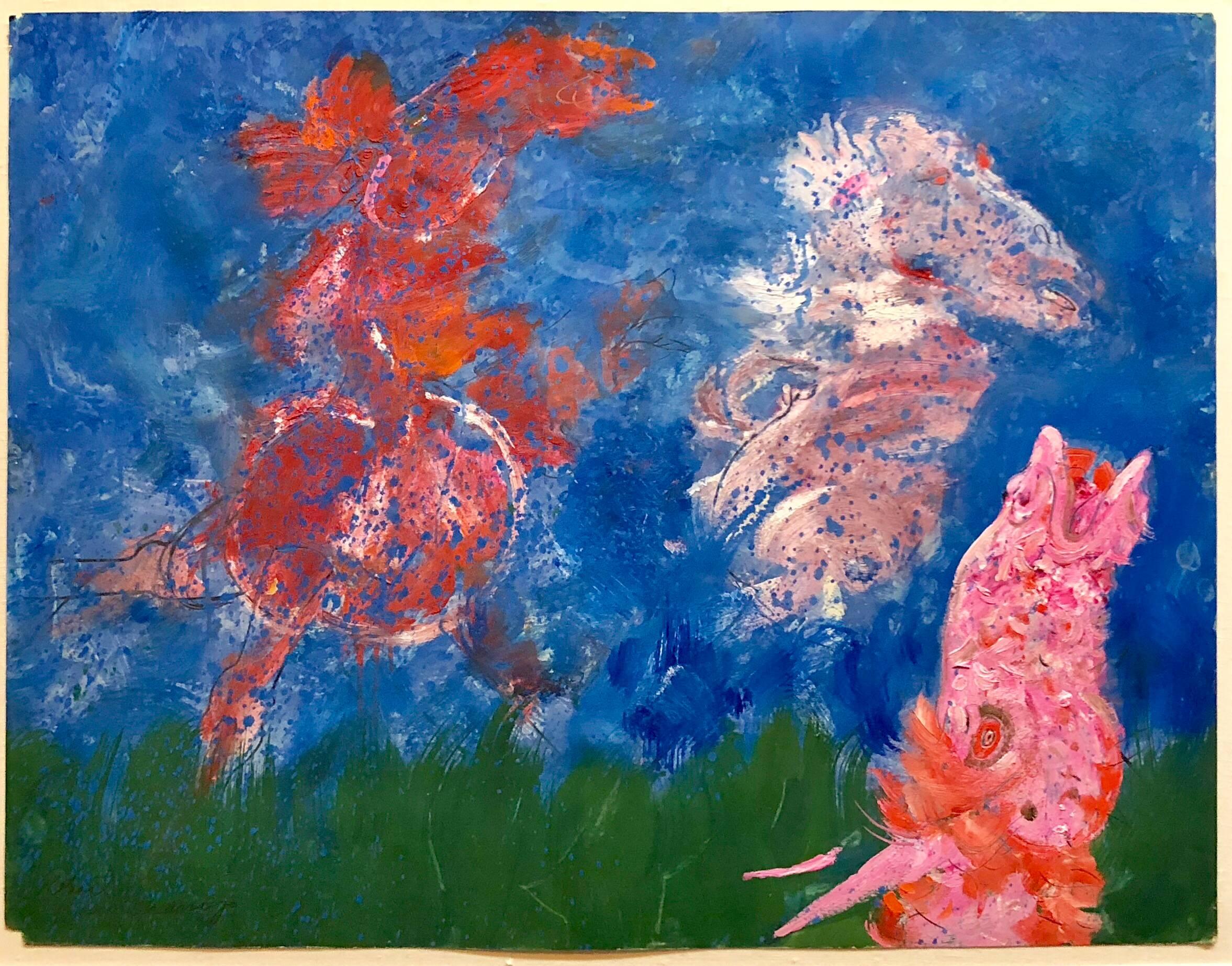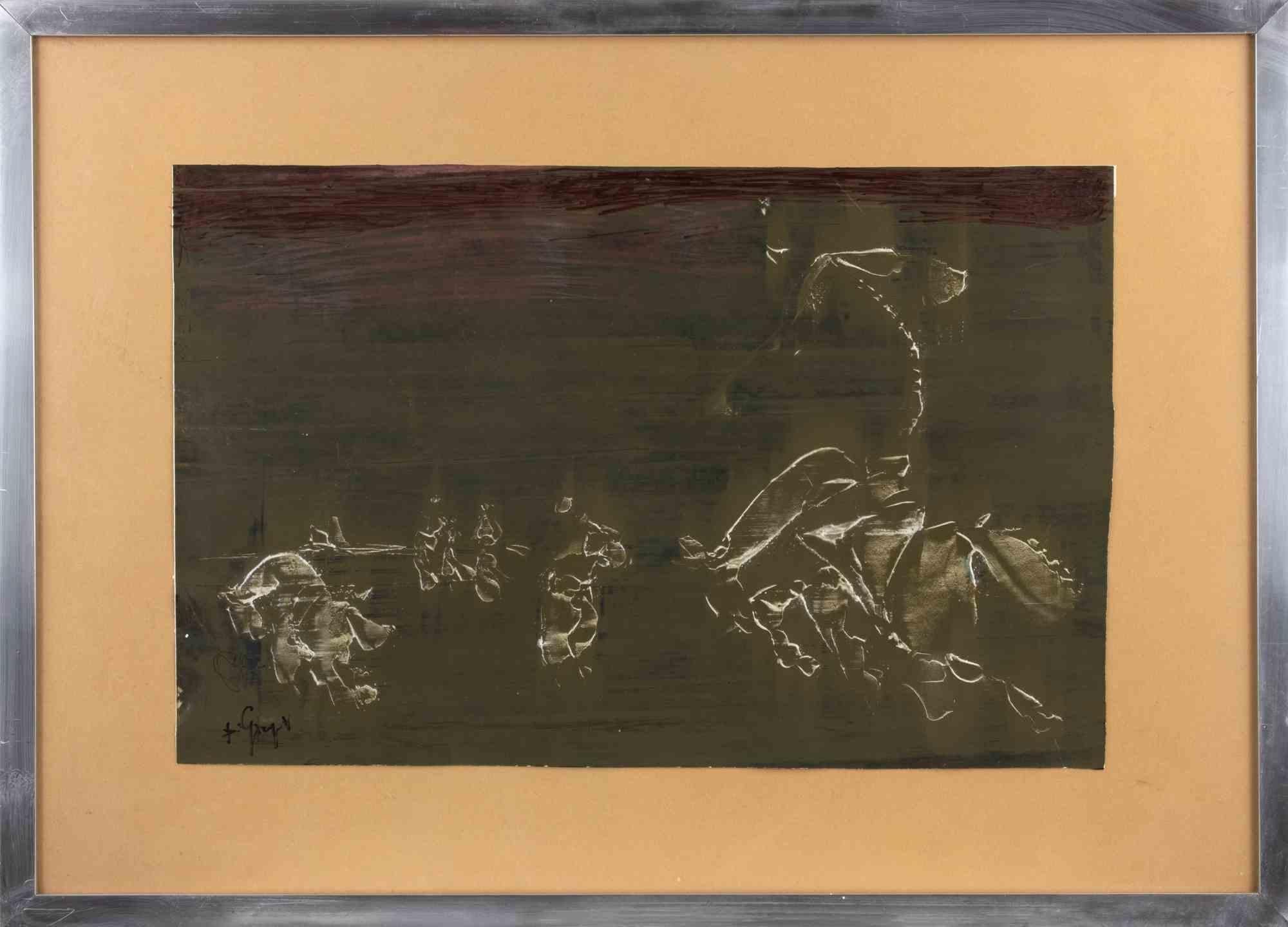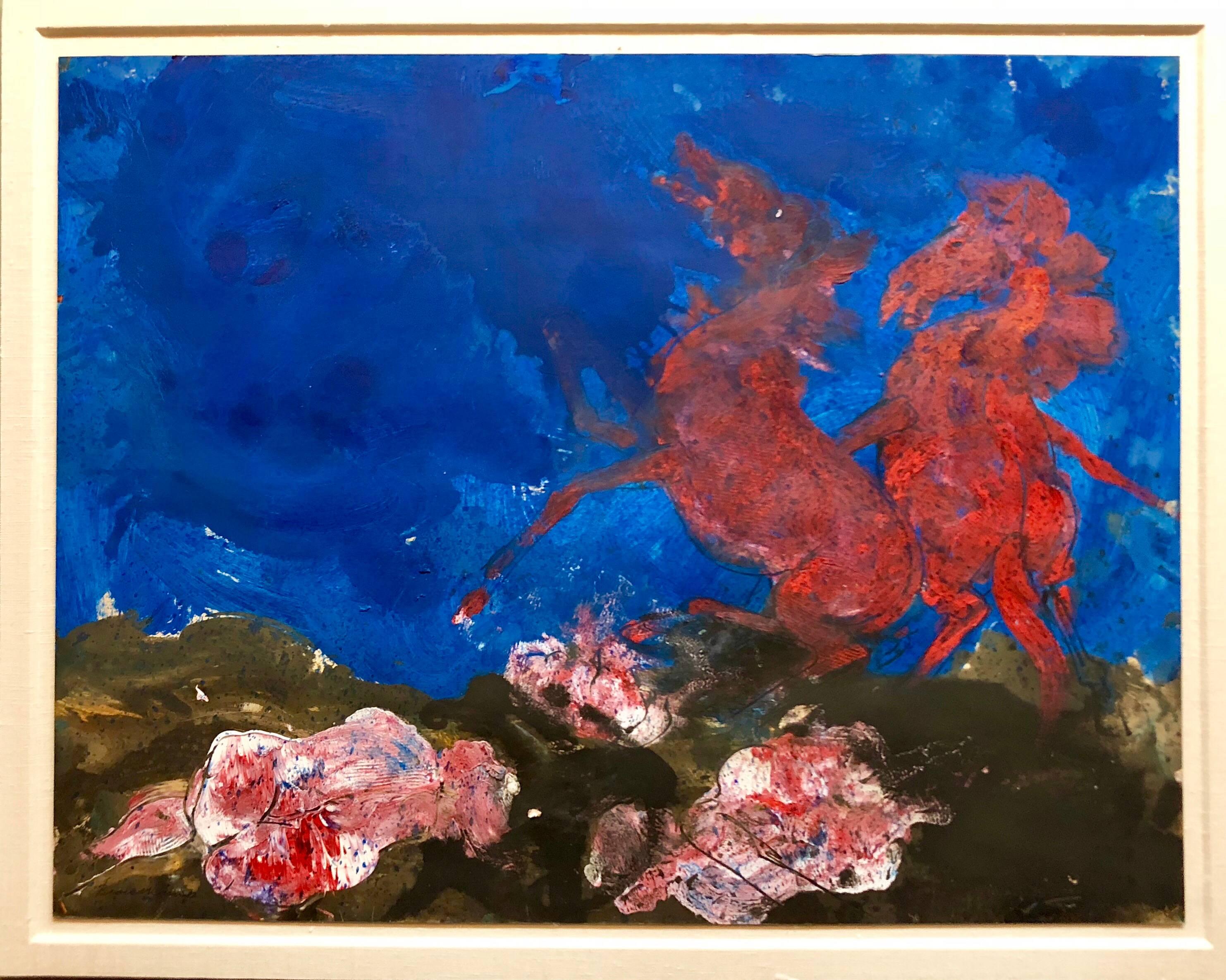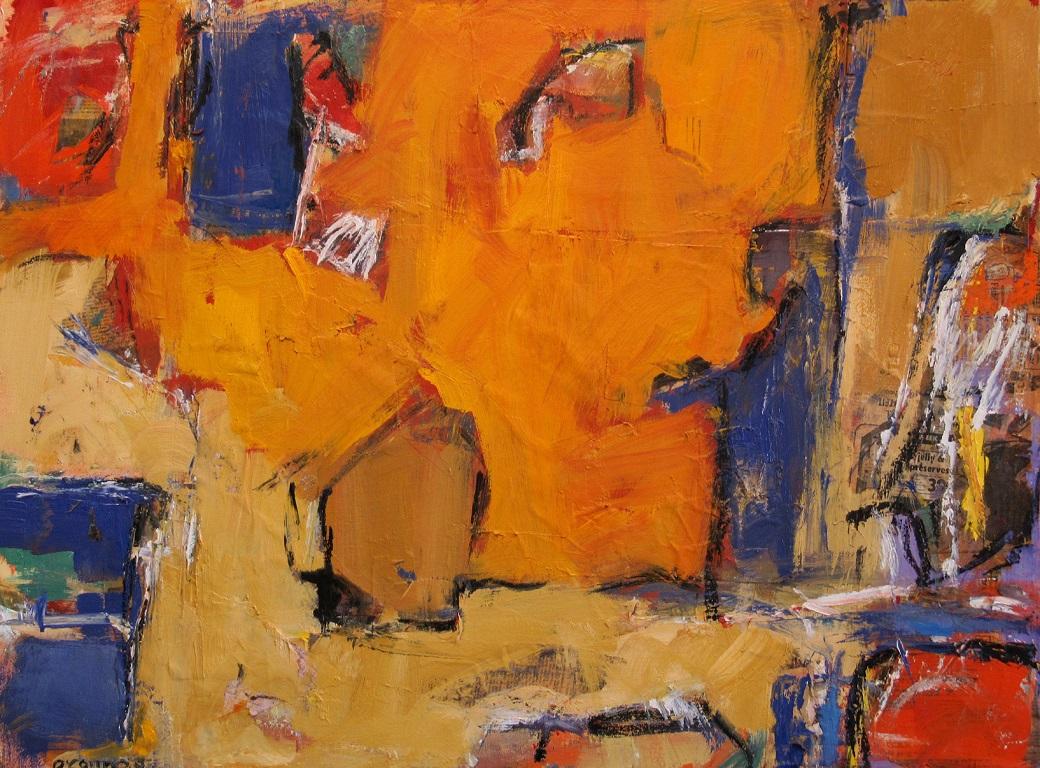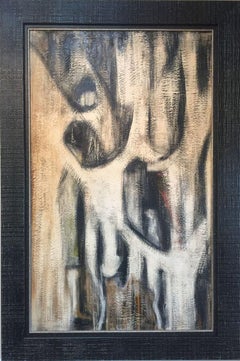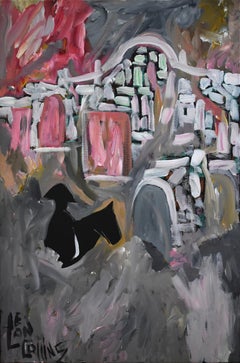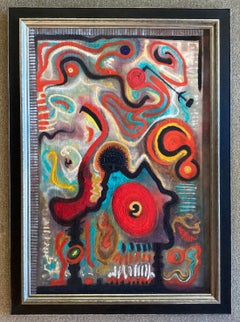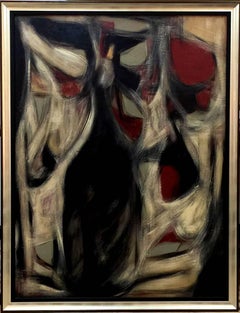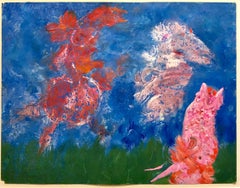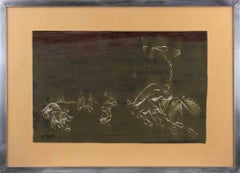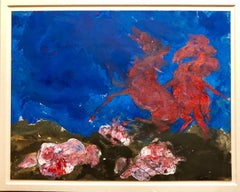Items Similar to "Dusk Till Dawn" An unusual perspective of a herd of horses. Looking from above
Want more images or videos?
Request additional images or videos from the seller
1 of 5
Joel Sidney Kelly"Dusk Till Dawn" An unusual perspective of a herd of horses. Looking from aboveCirca 2000
Circa 2000
$4,500
£3,406.02
€3,921.98
CA$6,401.72
A$6,934.65
CHF 3,651.37
MX$84,172.27
NOK 45,537.21
SEK 43,054.36
DKK 29,278.69
About the Item
Joel Sidney Kelly Alabama Artist Image Size: 32 x 48 Frame Size: 41 x 57 Medium: Textured Oil on Canvas "Dusk Till Dawn" Primarily known as a portrait artist. On a rare occasion would paint other subjects. This is so interesting as it is looking down on the herd.
Joel Sidney Kelly, III has called AL home for practically his entire life. His educational background is in architecture and music. Having never formally studied art, Joel has been disciplined in his pursuit of self-education by studying the techniques of Anders Zorn, Joaquín Sorolla, and John Singer Sargent and closely following the trends of contemporary portrait painters, and has been privileged to have studied with Michael Shane Neal- widely considered one of the top 10 living portrait artists in the world.
Joel has developed a distinctive style for many different subjects over the years including portraiture, figure, still life, and landscapes. He has been commissioned for portrait work from Charlotte, Atlanta, Nashville, Birmingham, Houston, and many cities in between. His artwork hangs in multiple galleries and museums, and has been published in magazines and newspapers.
- Creator:Joel Sidney Kelly (1960, American)
- Creation Year:Circa 2000
- Dimensions:Height: 41 in (104.14 cm)Width: 57 in (144.78 cm)Depth: 3 in (7.62 cm)
- Medium:
- Movement & Style:
- Period:
- Condition:
- Gallery Location:San Antonio, TX
- Reference Number:1stDibs: LU76932617783
About the Seller
5.0
Vetted Professional Seller
Every seller passes strict standards for authenticity and reliability
Established in 1974
1stDibs seller since 2017
102 sales on 1stDibs
Typical response time: 1 hour
- ShippingRetrieving quote...Shipping from: San Antonio, TX
- Return Policy
Authenticity Guarantee
In the unlikely event there’s an issue with an item’s authenticity, contact us within 1 year for a full refund. DetailsMoney-Back Guarantee
If your item is not as described, is damaged in transit, or does not arrive, contact us within 7 days for a full refund. Details24-Hour Cancellation
You have a 24-hour grace period in which to reconsider your purchase, with no questions asked.Vetted Professional Sellers
Our world-class sellers must adhere to strict standards for service and quality, maintaining the integrity of our listings.Price-Match Guarantee
If you find that a seller listed the same item for a lower price elsewhere, we’ll match it.Trusted Global Delivery
Our best-in-class carrier network provides specialized shipping options worldwide, including custom delivery.More From This Seller
View All"Corrida" Abstract The Bullfight
By Leopoldo Gonzales Jr.
Located in San Antonio, TX
Leopoldo Gonzales Jr
Born 1921
San Antonio Artist
Size: 36 x 22
Frame: 42.5 x 28
Medium: Casein
Circa 1958 Mid Century Modern
"Corrida"
Biography
Leopoldo Gonzales Jr Born 1921
Exh...
Category
1950s Abstract Abstract Paintings
Materials
Oil
"ALAMO" BLACK FOLK ARTIST Leon collins
By Leon Collins
Located in San Antonio, TX
Leon Collins
Birthdate Unknown
Galveston / Navasota Texas Artist
Image Size: 36 x 24
Medium: Acrylic on Canvas
"Alamo"
Leon Collins Birthdate Unknown
"The inspiration comes from my g...
Category
21st Century and Contemporary Impressionist Landscape Paintings
Materials
Acrylic
"NEW HORIZON" LARGE MID CENTURY MODERN ABSTRACT
By Michael Frary
Located in San Antonio, TX
Michael Frary
(1918 - 2005)
Austin Artist
Image Size: 51 x 35
Frame Size: 59 x 43
Medium: Oil
Dated 1970
"New Horizon"
Biography
Michael Frary (1918 - 2005)
Michael Frary was born in...
Category
1970s American Modern Abstract Paintings
Materials
Oil
"Penguin" Large Mid Century Piece on Masonite.
By Leopoldo Gonzales Jr.
Located in San Antonio, TX
Leopoldo Gonzales Jr Born 1921 San Antonio Artist Image Size: 48 x 36 Frame Size: 52 x 40 Medium: Oil / Casein Circa 1958 Mid Century Modern "Penguin"
Signed and titled on verso. ...
Category
1950s Abstract Abstract Paintings
Materials
Oil
"Landscape Fragment II" Abstract 1960 Mid-Century Modern
By Boyer Gonzales Jr.
Located in San Antonio, TX
Boyer Gonzales Jr. (1909-1987) Austin Artist Image Size: 18 x 24 Frame Size: 19 x 25 Medium: Oil
1960 "Landscape Fragment II"
Biography
Boyer Gonzales Jr. (1909-1987)
Boyer Gonzales Jr, a noted painter and teacher in Texas was born in
Galveston, Texas and raised in family homes in both Galveston and
Woodstock, New York. He attended Mercersburg Academy in Pennsylvania and
in 1931 graduated with a degree in architecture from the University on
Virginia.
During the summers while at the university he studied
with his father in Woodstock. After graduation he returned to Woodstock
and studied under Henry Lee...
Category
1960s Abstract Abstract Paintings
Materials
Oil
"TARNADO COMING" TEXAS BLACK FOLK ART FRAMED 12 X 29.5
By Leon Collins
Located in San Antonio, TX
Leon Collins
(Born 1930)
Galveston / Navasota Texas Artist
Image Size: 11 x 28.5
Frame Size: 12 x 29.5
Medium: Oil on Board
2024
"Tarnado Coming"
Leon Collins
Birthdate Unknown
Galve...
Category
2010s Impressionist Animal Paintings
Materials
Oil
You May Also Like
American Neo Expressionist "Wild Horses" Modernist Oil Painting
By Robert Beauchamp
Located in Surfside, FL
Signed lower left.
Robert Beauchamp (1923 – March 1995) was an American figurative painter and arts educator. Beauchamp's paintings and drawings are known for depicting dramatic creatures and figures with expressionistic colors. His work was described in the New York Times as being "both frightening and amusing,". He was a Guggenheim Fellow and a student of Hans Hofmann.
Robert Beauchamp was born in Denver, Colorado in 1923. He had three brothers and three sisters, and the children were orphaned by both parents by the time Beauchamp was three. The family grew up impoverished due to the Great Depression, living in a community house with other families. As a child he dabbled in art but it wasn't until high school that he began taking art classes. When not creating art he also played sports; football and basketball, and enjoyed chemistry and geology.
He was told he was good at drawing, and replaced study hall classes with art classes, receiving instruction and inspiration from a Welsh teacher named R. Idris Thomas. While in high school Beauchamp would go, every Monday, to the public library and a local museum where he would read books about art; specifically French painting, as assigned by Thomas. Beauchamp absorbed the tenets of European Modernism and American Abstract Expressionism—with which he eventually broke. While abstraction, with its focus on color and form, underlies his compositions, he filled canvas and paper with psychologically acute portraits of himself and others, nudes, animals, and objects of all kinds. Beauchamp would spend upwards of four hours a day in the art room and eventually won the Carter Memorial Prize, which provided a scholarship to the Colorado Springs Fine Arts Center. At Colorado Springs he studied under Boardman Robinson, painting landscapes in nature.
Beauchamp eventually joined the Navy and then returned to Colorado Springs to continue his studies. Traveling the world as an Armed Guard, he spent a year and a half at sea and the rest of the three years in San Francisco. Seeking to make money, and to follow his love for a girl, Beauchamp decided to attend Cranbrook Academy of Art from 1947–1948. There he studied pottery, believing one could "make more money selling pots than you could selling paintings." He described his experience at Cranbrook as intimidating and claustrophobic, and eventually switched to sculpture before switching to painting.
Beauchamp moved to New York City in the early 1950s and was involved in the Tenth Street galleries, which provided outlets for more experimental artists and the second generation of abstract expressionists. Despite his involvement with 10th Street and friendships with abstract artists, abstract art never interested in him. He showed at numerous galleries in New York and Provincetown, socializing with gallery owners, artists and collectors. His first exhibition was at the Tanager Gallery in New York, he also showed during the 1950s at the Hansa Gallery. In New York and Provincetown he studied under Hans Hofmann Eventually he felt that abstract expressionism became dull and stalemated.
During the 1960s he showed at the Green Gallery. C. 1960 he was awarded a Fulbright Award allowing him to travel to La Romola, Italy. He traveled frequently to cities such as Rome and worked constantly. Beauchamp returned to the states and lived in Provincetown at Walter Gutman's house, who awarded Beauchamp a grant. That year he met his future wife, Nadine Valenti, whom he married in 1967. Beauchamp taught at a variety of schools during his lifetime including Brooklyn College, School of Visual Arts, Cooper Union and the Art Students League of New York during the last fifteen years of his life.
Beauchamp described his drawings as painterly, seeking the spontaneity in an image. He would develop a drawing then a painting, and vice versa. His heavily impastoed paintings, often described as sculptures themselves, came from the pouring of paint from a can, with little planning and constant evolution in the medium upon the canvas. He preferred little planning to his creations, believing that an artists work would become stale and repetitive with constant planning.
He also created large scale works, at times 70 inches long. Beauchamp had little intention of ever selling his large works, preferring to create them due to the slow and intense experience he received from the process. The large drawings he created on the floor, and the smaller works were created on a table. Paintings were created on either the floor or wall and he described his painting process as "splattering", "pushing the paint around," and sponging.
Animals often appear in his paintings, despite a dislike for domestic animals outside of his artistic creations. He called the characters in his paintings as Beauchamps. Some Beauchamps hold meaning, with Beauchamp rarely sharing the meaning behind the symbols and characters. He made up the creatures himself, seeking to emphasize the character of each.
In 2006 the University of Massachusetts Amherst College of Visual & Performing Arts hosted an exhibition of Beauchamp's pieces from the 1960s, curators stated that Beauchamp's work: "effortlessly blends innovative style elements with narrative, descriptive images. One senses equal enjoyment in the manipulation of, and interaction with, color and paint, and the often sudden and unexpected presence of a wasp or a lump of sugar."
included in the important exhibit "Twelve New York Painters." New York: David Findlay Jr. Fine Art with Mary Abbott, Alcopley, Robert Beauchamp, Byron Browne, Charles Cajori, Jim Forsberg, Carl Heidenreich, Angelo Ippolito, Emily Mason, Robert Natkin, Robert Richenburg and Nina Tryggvadottir...
Category
20th Century Neo-Expressionist Abstract Paintings
Materials
Paper, Oil
'Untitled Abstract Horses and Cow', by David Crown, Oil on Canvas Painting
Located in Oklahoma City, OK
This 20" x 24" oil on canvas painting by David Crown dates to 1985. The focal point of this painting are three animal figures in the foreground rendered in...
Category
1980s Abstract Abstract Paintings
Materials
Canvas, Oil
Horses - Oil Painting by Vincenzo Di Giorgio - Mid-20th Century
Located in Roma, IT
Horses is a modern artwork realized by Vincenzo Di Giorgio in the mid-20th century
Painting on paper.
Includes frame
Hand signed on the lower margin
Category
Mid-20th Century Modern Animal Paintings
Materials
Canvas, Oil
American Neo Expressionist "Wild Horses" Modernist Oil Painting
By Robert Beauchamp
Located in Surfside, FL
Robert Beauchamp (1923 – March 1995) was an American figurative painter and arts educator. Beauchamp's paintings and drawings are known for depicting dramatic creatures and figures with expressionistic colors. His work was described in the New York Times as being "both frightening and amusing,". He was a Guggenheim Fellow and a student of Hans Hofmann.
Robert Beauchamp was born in Denver, Colorado in 1923. He had three brothers and three sisters, and the children were orphaned by both parents by the time Beauchamp was three. The family grew up impoverished due to the Great Depression, living in a community house with other families. As a child he dabbled in art but it wasn't until high school that he began taking art classes. When not creating art he also played sports; football and basketball, and enjoyed chemistry and geology.
He was told he was good at drawing, and replaced study hall classes with art classes, receiving instruction and inspiration from a Welsh teacher named R. Idris Thomas. While in high school Beauchamp would go, every Monday, to the public library and a local museum where he would read books about art; specifically French painting, as assigned by Thomas. Beauchamp absorbed the tenets of European Modernism and American Abstract Expressionism—with which he eventually broke. While abstraction, with its focus on color and form, underlies his compositions, he filled canvas and paper with psychologically acute portraits of himself and others, nudes, animals, and objects of all kinds. Beauchamp would spend upwards of four hours a day in the art room and eventually won the Carter Memorial Prize, which provided a scholarship to the Colorado Springs Fine Arts Center. At Colorado Springs he studied under Boardman Robinson, painting landscapes in nature.
Beauchamp eventually joined the Navy and then returned to Colorado Springs to continue his studies. Traveling the world as an Armed Guard, he spent a year and a half at sea and the rest of the three years in San Francisco. Seeking to make money, and to follow his love for a girl, Beauchamp decided to attend Cranbrook Academy of Art from 1947–1948. There he studied pottery, believing one could "make more money selling pots than you could selling paintings." He described his experience at Cranbrook as intimidating and claustrophobic, and eventually switched to sculpture before switching to painting.
Beauchamp moved to New York City in the early 1950s and was involved in the Tenth Street galleries, which provided outlets for more experimental artists and the second generation of abstract expressionists. Despite his involvement with 10th Street and friendships with abstract artists, abstract art never interested in him. He showed at numerous galleries in New York and Provincetown, socializing with gallery owners, artists and collectors. His first exhibition was at the Tanager Gallery in New York, he also showed during the 1950s at the Hansa Gallery. In New York and Provincetown he studied under Hans Hofmann Eventually he felt that abstract expressionism became dull and stalemated.
During the 1960s he showed at the Green Gallery. C. 1960 he was awarded a Fulbright Award allowing him to travel to La Romola, Italy. He traveled frequently to cities such as Rome and worked constantly. Beauchamp returned to the states and lived in Provincetown at Walter Gutman's house, who awarded Beauchamp a grant. That year he met his future wife, Nadine Valenti, whom he married in 1967. Beauchamp taught at a variety of schools during his lifetime including Brooklyn College, School of Visual Arts, Cooper Union and the Art Students League of New York during the last fifteen years of his life.
Beauchamp described his drawings as painterly, seeking the spontaneity in an image. He would develop a drawing then a painting, and vice versa. His heavily impastoed paintings, often described as sculptures themselves, came from the pouring of paint from a can, with little planning and constant evolution in the medium upon the canvas. He preferred little planning to his creations, believing that an artists work would become stale and repetitive with constant planning.
He also created large scale works, at times 70 inches long. Beauchamp had little intention of ever selling his large works, preferring to create them due to the slow and intense experience he received from the process. The large drawings he created on the floor, and the smaller works were created on a table. Paintings were created on either the floor or wall and he described his painting process as "splattering", "pushing the paint around," and sponging.
Animals often appear in his paintings, despite a dislike for domestic animals outside of his artistic creations. He called the characters in his paintings as Beauchamps. Some Beauchamps hold meaning, with Beauchamp rarely sharing the meaning behind the symbols and characters. He made up the creatures himself, seeking to emphasize the character of each.
In 2006 the University of Massachusetts Amherst College of Visual & Performing Arts hosted an exhibition of Beauchamp's pieces from the 1960s, curators stated that Beauchamp's work: "effortlessly blends innovative style elements with narrative, descriptive images. One senses equal enjoyment in the manipulation of, and interaction with, color and paint, and the often sudden and unexpected presence of a wasp or a lump of sugar."
included in the important exhibit "Twelve New York Painters." New York: David Findlay Jr. Fine Art with Mary Abbott, Alcopley, Robert Beauchamp, Byron Browne, Charles Cajori, Jim Forsberg, Carl Heidenreich, Angelo Ippolito, Emily Mason, Robert Natkin, Robert Richenburg and Nina Tryggvadottir...
Category
20th Century Neo-Expressionist Abstract Paintings
Materials
Paper, Oil
"La Chevauchèe des Couleurs", Jean-Claude Gaugy, Oil on Board, Contemporary
Located in Dallas, TX
"La Chevauchèe des Couleurs" is an original oil on board painting that measures 30x40 inches and comes unframed. Gaugy uses his textured lines and hues o...
Category
2010s Contemporary Animal Paintings
Materials
Oil, Board
WILD HORSES-3, Original Signed Contemporary Abstract Expressionist Painting
Located in Boston, MA
WILD HORSES-3, Original Contemporary Abstract Expressionist Painting, 2021
30" x 40" x 2" (HxWxD) Oil and Newspaper on Canvas
Hand-signed by the artist.
This large-format oil painti...
Category
21st Century and Contemporary Abstract Expressionist Abstract Paintings
Materials
Canvas, Oil, Newsprint
